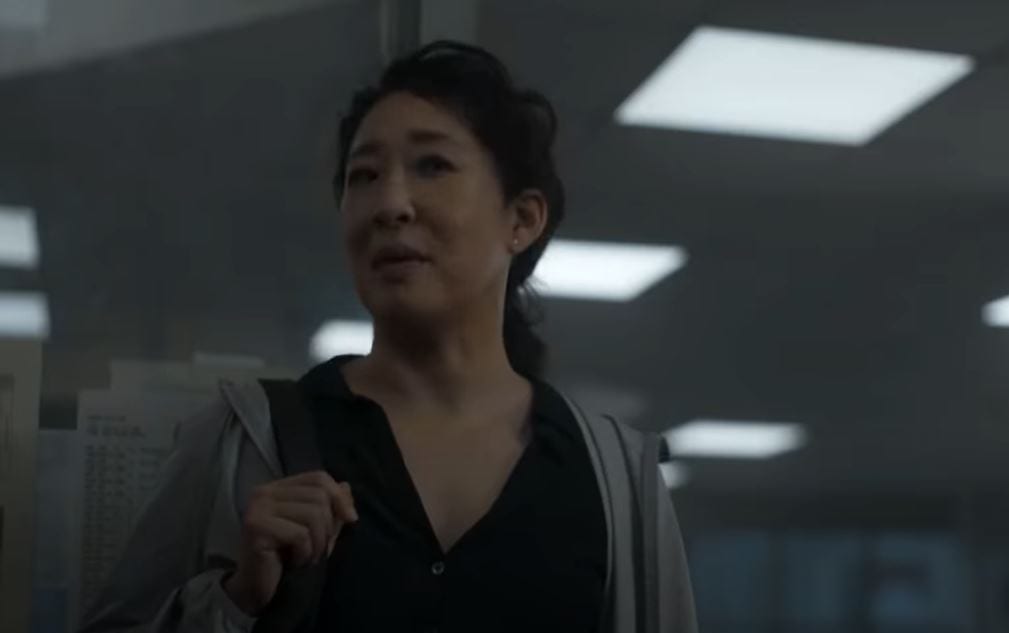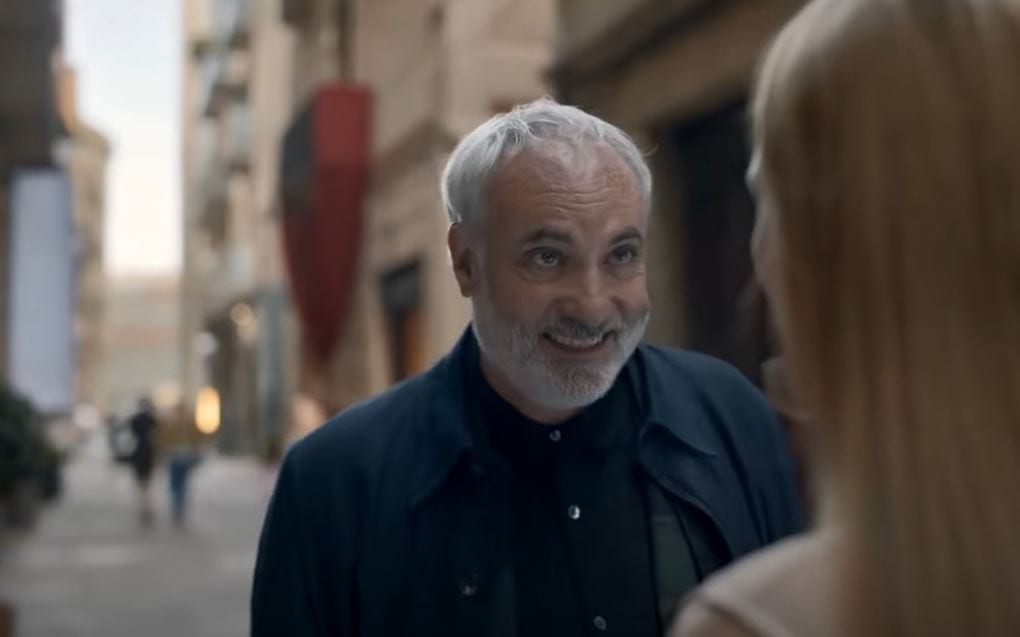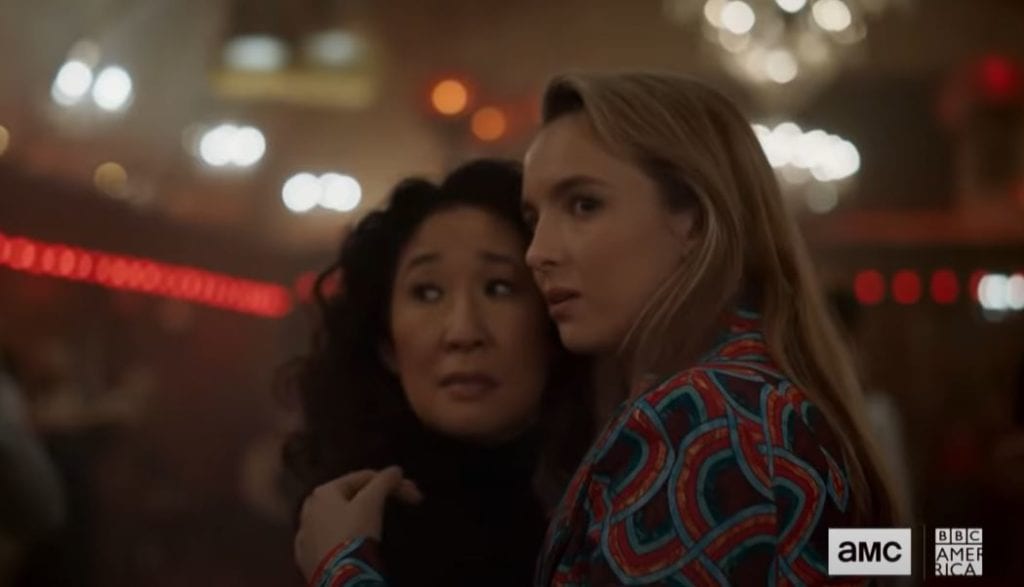When Killing Eve first aired back in 2018, myself and many others loved it for a variety of reasons. It was a show about murder that was outrageously funny. There was an unrepentant, proud antagonist with incredible, irresistible charisma. The protagonist had an edge which made her susceptible to seduction by said antagonist. Both characters being women created a boldly queer vision of the show upon which the very soul of Killing Eve was based. Every episode was fast, focused, eventful, and kept this dynamic between its female leads at the heart of everything.
With season 3’s recent end, opinions have split considerably on the quality and future of Killing Eve. What was once universally considered one of the best shows on television has lost critics and left fans divided.
I found myself trending towards the negative side of things rather early in season 3. While I most certainly enjoyed season 2, cracks did begin to show and the loss of Phoebe Waller-Bridge became immediately noticeable. The energy had changed. The focus dulled. Likeable characters from the first season were replaced with dull characters at best and bad characters at worst. Pressing questions went ignored or received disappointing answers.
When these cracks in the show’s structure and quality continued in season 3, alongside new ones, I could not help but feel immediately disappointed. It was a feeling that continued throughout the season, all the way to the disappointing end. Season 3 has left me with little hope for the future of the series. It left me wondering whether I will bother watching season 4 at all.
So what is going so wrong? Well…a lot.

Killing…Who, Again?
Once upon a time, Eve Polastri was the driving force of Killing Eve. The narrative overwhelmingly followed her life and the plot moved forward based on her decisions. Season 2 had her take a slight step back in favor of more Villanelle, but that was understandable. Villanelle’s popularity demanded a bit more of her. It was still Eve’s show, and she still played an essential role in the season’s events.
What made Killing Eve interesting was having a character like Eve in the driving force for this kind of storyline. The entire point of the show was to follow her awakening into a more exciting life and recognized her expanded sexuality. Villanelle was the key figure responsible through both, and Eve’s continued chase of the assassin represented her further submergence into this new life. The main character conflict of the show was this personality duel between the two. Would Eve fall too deeply into Villanelle’s world or not?
Then season 3 came along and…well, what happened to this central focus of the show?
I’m not even sure what Eve’s arc was. She drives little to none of the plot. She gets less screentime than multiple side characters. Her character does not really move forward in any meaningful way until the final couple episodes, and there’s no real catalyst for those ending moments. Even those who did enjoy the season often lamented the lack of Eve’s presence.
There are many reasons why Killing Eve felt like a directionless season stalling for time, and Eve stands tall among all the others. The final moments of season 2 demanded meaningful change in the dynamic between Eve and Villanelle. Being shot and left for dead demanded that Eve make a choice about whether her near-death experience would scare her away for good, or make her commit to diving even deeper into Villanelle’s world.
Instead she has the same struggles we saw play out during season 2, except this time Eve has nothing else going on. She starts the season seemingly struggling to cope with nearly dying, only to have the concept dropped with little genuine exploration. Then she struggles between the life Niko represents and the life Villanelle represents, which we have seen through 2 seasons already, until the choice is made for her by Niko’s own brush with death. She drives little of this. The choices are made for her time and again. Eve passively floats wherever the story and other characters take her.
It is a drastic difference from the proactive, determined character of the first two seasons. Where was that Eve, the one who barely hesitated to act on her own? The one whose ego and conviction refused to let anyone sideline her? Now everyone sidelines her, and she barely fights.
This kind of passiveness could have worked in the aftermath of Villanelle shooting her if Eve had gotten her typical screentime to explore her thoughts. That simply did not happen.
I’m not sure why the title character of Killing Eve would be left behind so drastically, but season 3 was worse for it.
Side Character Gumbo
Leaving Eve behind also could have worked if the characters taking her screentime were compelling enough. There was space for Carolyn’s arc to really work, or Konstantin’s, or Geraldine’s, or Dasha’s, or Irina’s…are you noticing the pattern yet? Season 3 of Killing Eve could have tried to replace Eve’s lost screentime with a couple well-crafted arcs for the side characters. Instead they tried to give numerous arcs to numerous side characters without an of the proper exploration needed.
This unfortunately resulted in all these characters being Flanderized down to a couple boring traits, rather than any of them fleshing out into characters interesting enough to keep the story interesting. Carolyn’s air of intrigue and intelligence was reduced to repetitive scenes highlighting her lack of healthy emotion. Geraldine suffered for being the nagging voice repetitively begging Carolyn for more emotion. Konstantin was reduced to being scared in the dark and wanting to run. Irina was the same character as always, but with increased exposure, she quickly became annoying.
Many fans will disagree with me, but no one suffered for being Flanderized more than Carolyn and Konstantin. In the lofty heights of season 1, both characters stood out for the manipulative mystery about them. They played similar mentor roles to Eve and Villanelle that left you thinking they were part of this untouchable upper crust of the world that pulled the strings attached to thousands of Eves and Villanelles around the world.
The vaguely explored mysteries of these characters made them more interesting. Then season 3 boiled away the mystery and left them just like everyone else.
Again, humanizing either character could have worked if a sense of purpose and trajectory existed. I got no such sense at any point. Instead, it felt like Killing Eve took the traits they felt the audience liked and focused those characters entirely on those traits. If you are going to strip time from the main characters in favor of side characters, at least make sure there is a journey worth taking with those characters.

Oh My God, They Killed Kenny!
A big reason season 3 of Killing Eve felt disappointing from the beginning related to Kenny’s cliffhanger death to end the first episode. His death felt like an absolute waste of one of the best side characters on the show, one worth exploring with the kind of screentime given to so many other side characters in subsequent episodes.
I gave the moment a chance. After all, his death should have easily served as the catalyst bringing Eve and Carolyn together again, each determined to find out who killed him and why. So why didn’t that happen?
Kenny’s death turned out to matter little to anything. We see little of Eve or Carolyn investigating his death. He goes forgotten for multiple episodes. His death serves as no catalyst for the plot. Kenny’s death feels like a shocking plot point thrown in to get people talking, rather than a purposeful moment driving any meaningful development of the characters and plot.
Ideally, his death would be crucial to Carolyn’s character. I would argue that it was rarely used as such, and not necessary to the overall direction her character took. Kenny could have died in the first or last episode of the season and nothing else would change. His death was used as little more than a reason for Carolyn and Geraldine to have the same argument in every episode. He was used for them, rather than to remember Kenny and his impact on the cast through the first two seasons.
Ultimately, things still could have worked out if the answers about his death proved satisfying. Instead we got…what? That he tripped off the roof? Maybe Konstantin was lying, but Carolyn let him live anyway? And all of this in a five-minute scene the final episode rushed through? They couldn’t even give Kenny’s death a clear, definitive answer that forced the characters to make a real choice?
Kenny deserved better than a quick dirty death to be forgotten.
Villanelle, the Unproblematic Fave
Here’s where I’ll present my most controversial problem with the season. Frankly, I do not like the direction they took Villanelle in. At all.
In a season of disappointments, she represents every flaw in a single package. She suffered from significant Flanderization, with her childish behavior becoming far too prominent and wacky. Her arc was unfocused, repetitive and slow. Episodes focused on other characters instead of her and the final episode had little to do with her. Thankfully she wasn’t sidelined the way Eve was, and Jodie Comer was as amazing as ever, but it was through sheer force of her personality that I didn’t entirely dislike Villanelle this season.
And, frankly, I just do not like the trajectory of her arc anymore. What made Villanelle such an immediate, dynamic star in season 1 was the way her fun, clever personality and wacky behavior contrasted the unabashed brutality and skill of her murders. She made us like her despite being a villain in every sense of the word. She attracted the audience to her world the same way she attracted Eve.
Season 3, for whatever reason, decided to double down on an idea hinted at and then abandoned in season 2; the idea of Villanelle as the vulnerable, misunderstood hero to be redeemed.
Painting Villanelle in this light was largely responsible for shifting her eccentricities from interesting to overbearing. She becomes childish in an unpleasant way, a repressed little girl who never grew up. Killing Eve drove this point home with season 3’s decision to focus on her family. Suddenly Villanelle is no longer someone who kills because she enjoys it. Now she has a “darkness” that she inherited from her mother and she wants to change. She no longer became an assassin because she wanted to be one. Now she was mistreated and abused by her mother and Dasha, a lonely soul only seeking family all along.
Perhaps I’m in the minority about this, but I never got that sense from her at all and it was Villanelle’s unapologetic love for her life that made her interesting. It was the reason she served as such a perfect temptation for Eve. Here was someone who had given in to the danger which so fascinated Eve and drew her deeper into the world. Again, the show was always about Eve, and whether she would give in to Villanelle or resist. The show would presumably end with Eve making her final decision.
With this new turn for Villanelle, the nature of the show changed entirely. Now it is no longer about a likable antagonist seducing the protagonist physically, emotionally, and symbolically. The dynamic has shifted entirely in the opposite direction. The charismatic, unapologetic woman assassin was something unique, fun, and refreshing. The tragic child who never grew up and just wants to be normal has been done a thousand times and infantilizes Villanelle. Her force of personality in the first two seasons no longer belongs to her, it is now a tragic mistake she was never proud of. Villanelle is just another vulnerable woman on TV. We’ve seen that. It’s overplayed and uninteresting compared to the brutal assassin with no vulnerability besides Eve.
Frankly, she no longer has the edge which seduced both Eve and the audience.
I’m left with the question of whether this turn was a temporary stalling tactic for this season alone, or part of a greater arc to reform Villanelle. Either way, I am disappointed.
Eve and Villanelle, Murdering in a Tree
By far the biggest sin of the season was the nearly complete lack of Villanelle and Eve content. I cannot imagine anyone disagreeing that their dynamic is the driving force of the show. It is why we’re all watching. Even when they did not appear on-screen together, every scene in seasons 1 and 2 still focused on the relationship between Eve and Villanelle. Their every moment informed on their dynamic in some way.
To say season 3 was a marked change is an understatement. Let’s even leave aside the various side characters who took time from them. For the first time, Eve and Villanelle had numerous scenes with absolutely no influence on their bond. Villanelle focused on family and promotions. Eve focused on Kenny, if she was around at all. They shared barely a handful of scenes together.
Whatever complaints anyone has about season 2, it still understood that the core appeal of Killing Eve involves the seduction of Eve by Villanelle. It understood that Eve must chase Villanelle, and Villanelle must use this chase to bring Eve’s darkest desires to light. Everything else must serve this core plot. Even the side characters and their arcs must somehow serve Eve and Villanelle.
Why did season 3 lose sight of this fact?
If I had to guess, it is because the writers don’t know where to go with them. Or if they do, they are dragging it out as long as possible. Once again, season 2 ended in a way that could not retain the status quo between Eve and Villanelle. Killing Eve’s solution seemed to be to just ignore it as much as possible. They did not have to move things forward if they simply don’t move them at all. This was especially true of Eve, who repeated her struggle between her old life and the life Villanelle represents, but with a lot less attention since the ground has been tread so many times already.
This lack of movement or evolution left the third season feeling formulaic in a way Killing Eve never did at its best. It also felt like they completely lost sight of the best part of the show. Whether this was the mistake of falling too in love with their side characters, an attempt to stall the story, or a combination or both, the effect is ultimately the same.
This also left the final scene lacking the power that should be inherent to the moment. Here was Eve, on a bridge, committing to her feelings for Villanelle. Even when presented with an opportunity to turn her back, she refuses. I should love it, and I should feel like this was a real turning point, but season 3 suggests they will return to the status quo, and the bridge scene only exists to tell us more seasons will exist.
Even if season 4 recommits to VilllanEve dynamic, season 3 still feels like a waste.

Ultimately, season 3 transformed Killing Eve into the exact opposite of what grabbed attention in season 1. It stalled where season 1 moved. It apologized where season 1 refused. Side characters dominated screentime instead of Eve and Villanelle. The sharp, aggressive pace slowed to a measured, softer tone. An entirely different show emerged, and I can’t say that show proved nearly as compelling.
Perhaps this was just the inevitable result of changing showrunners every season. Killing Eve lacks a singular vision driving the story forward. Maybe this problem is what discourages me more than anything else. With season 4 being helmed by yet another new showrunner, who knows what vision they have for Killing Eve? Who knows what the focus will be? Who knows what they will decide to do with these characters?
I guess I’m just coming to terms with the fact that I loved one showrunner’s vision for Killing Eve, and that showrunner left in season 1, where Killing Eve increasingly looks like it should have also left off. Wherever the story goes from here, I know it is no longer the story I wanted to see, or one nearly as interesting as what it should have been.

